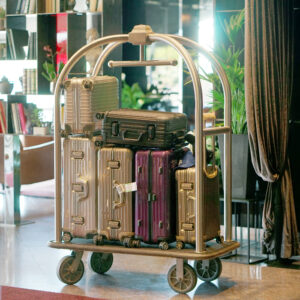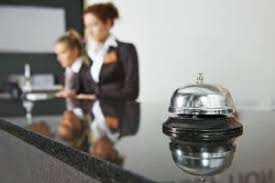 Did you lose your job to COVID-19? If so, you joined me and millions of other Americans who have suffered from the effects of the pandemic. It’s hardly a secret that the hospitality industry has been rocked over the past year. 47% of hospitality workers were furloughed or laid off as a result of the disruption in the hospitality industry.
Did you lose your job to COVID-19? If so, you joined me and millions of other Americans who have suffered from the effects of the pandemic. It’s hardly a secret that the hospitality industry has been rocked over the past year. 47% of hospitality workers were furloughed or laid off as a result of the disruption in the hospitality industry.
In turn, I was furloughed in April 2020 from my position as an Events Specialist at a meetings & events venue in Midtown, New York City. I was planning, coordinating, and managing 500+ person conferences for Fortune 500 clients like Amazon Web Services, Bank of America, and Deloitte. Life felt like a dream and I was days away from receiving an offer letter for a promotion when COVID-19 hit.
Unfortunately, I was laid off a few weeks after being furloughed, and it forced me into a very sudden and vigorous job hunt. Given the unreliability of the hospitality industry, I decided to pivot and pursue a career that might make use of my college marketing major. As part of that process, I began applying for sales and marketing jobs in the Northern Virginia area. I saw that one of my sorority sisters was enjoying her role as a Sales Development Representative (SDR) at a nearby high-tech sales consulting firm (memoryBlue!), so I decided to reach out and give the application process a shot.
Launching a professional high-tech sales career sounded intriguing, but I’ll admit a few things up front: I was intimidated by cold calling sales prospects in the entry-level SDR role, I lacked knowledge in the high-tech area, and I knew little about the sales process in general. But, as the interview process unfolded, I ended up sincerely eager to get the position.
Luckily, I started my sales career in the right place. memoryBlue features a unique, intensive training program that rapidly ramps up new SDRs by helping them develop a vast set of highly useful sales skills. Six months later, I have grown so much with the support of my peers and mentors, and I consistently rank in the Top 10 of 175+ SDRs company-wide each month.
If you are a previous hospitality industry professional, or anyone looking to make a change in the trajectory of your career and professional life, this article is for you! Perhaps my story can inspire you and illustrate why you can, and should, initiate the transition from hospitality to sales.
Hospitality Roles Make Outstanding Foundations for Sales Careers
A hospitality role, whether it be a bartender, hotel receptionist, events specialist, etc., can truly build a foundation for your career in sales. Hospitality is customer-centric – it revolves around the satisfaction of customers and providing exceptional experiences for them. In order to satisfy a customer, you must understand their needs to customize their experience and deliver exceptional results. As an Events Specialist, I would ask my clients a handful of questions to fully understand their vision and expectations to execute a successful event. Similarly, an SDR needs to ask the prospect engaging questions to understand their current situation, identify their needs, and tailor the discussion to align with their situation. The common SDR question, “What challenges are you experiencing with your current solution?” gets the prospect to open up about what they might not realize they are looking for in their next solution. Their response allows you to better shape your pitch to address their needs. Ideally, a discussion like this will resonate with the prospect and solidify a next steps meeting. Your ability to personalize a customer’s experience will enable you to tailor the perfect pitch to your prospect.
 As hospitality workers always strive to deliver a personable, exceptional experience, a difficult customer encounter is inevitable every now and then. You try your best to satisfy the customer, but made a mistake or miscommunication, and now you have an angry, dissatisfied individual. It happens – you develop thick skin, learn from your mistakes, and move on. SDRs have resiliency as well. We get hung up on, rejected, and sometimes yelled at. It’s all part of the job – but you learn from the conversation and grow because of it.
As hospitality workers always strive to deliver a personable, exceptional experience, a difficult customer encounter is inevitable every now and then. You try your best to satisfy the customer, but made a mistake or miscommunication, and now you have an angry, dissatisfied individual. It happens – you develop thick skin, learn from your mistakes, and move on. SDRs have resiliency as well. We get hung up on, rejected, and sometimes yelled at. It’s all part of the job – but you learn from the conversation and grow because of it.
Josh O’Brien, SDR Team Lead at Datanyze, stated that he “looks for [candidates] coming from a customer-facing role (restaurant, retail, customer service) who’ve dealt with, and overcome, customer nonsense on a day-to-day basis because they are going to be the first ones to be hung up on, cursed at and berated.”
Your resiliency in hospitality will beneficially carry over into being a strong SDR.
Successful hospitality workers have an unmatched work ethic. They will often spend well over their 8-hour scheduled shift to serve the customer as best as possible, only to do it all over again the next day. They are typically hard working and relentless. Likewise, a successful SDR will have a strong work ethic. They hustle hard every day to make hundreds of cold prospect calls, send multiple personalized emails, and spend countless hours researching new prospects. They are also willing to work overtime and on weekends to stay on track for quota, meet their metrics, and deliver quantifiable results for their campaign. Your diligent work ethic from working in hospitality will help you immensely to excel as an SDR.
Transitioning from Hospitality to Sales
Given that a prior hospitality role can build the foundation for a proficient sales career, the transition can be smoother than you might think. There are many transferrable skills that carry over from working in the hospitality industry, like communication, organization, time management, active listening, and personalization. You can leverage these transferrable skills to shape yourself into a successful SDR. You can also leverage your experience working on a team. If you are team-oriented, you will fit in well, because SDRs are constantly sharing what is working, giving feedback, and collaborating to help each other grow and excel.
While you can leverage a variety of transferrable skills from your previous hospitality role, you will need to shift your mindset from customer-centric to sales-centric. One of my mentors at memoryBlue stresses the importance of switching from a ‘customer is always right’ mentality to a ‘prospect doesn’t get to push me around’ mentality. SDRs should not tolerate a prospect’s brush offs, no-shows, or disrespectful comments. A good sales professional always stands up for themselves and holds the prospect accountable for their actions.
Matthew Dixon, author of The Challenger Sale: Taking Control of the Customer Conversation, says the most successful sales reps “push the customer, but do so with respect and sensitivity to how the customer is reacting.” SDRs should serve the prospect, but not be afraid to maintain equal professional footing as they do so. SDRs continuously grow by standing their ground and taking control of the customer conversation.
Pursuing a Sales Development Role
Now that you’ve realized hospitality and service industry experience can build a rock solid foundation for a great sales career, I want to share some guidance on how to initiate the search. The SDR role is a challenging one, so make sure you find the right company that is going to support you and your growth. Apply to companies with a reputable company culture, because a great culture fit is crucial to staying happy in the workplace. You should also look for a company that has a solid pay structure and offers incentives, bonuses, reward vacations, and additional time off to motivate you to put in the extra hustle. Finally, and perhaps most importantly, you want to look for a company that offers opportunities for growth (both internally or externally), because keeping your focus on the possibilities of the future will help you stay driven and motivated through the challenges of the SDR role.
Once you have found the perfect fit, show the hiring company how you are going to excel as an SDR within the organization. These “Three Be’s” should be your guide:
- Be Coachable – you should be able to accept and apply constructive criticism from your peers in order to develop your skill set.
- Be Curious – Harvard Business Review states that “82% of top salespeople [have] extremely high curiosity levels” because the best SDRs are curious about the industries they sell into, the prospects they will be chatting with, and all the facets of how they could possibly help their prospect build a better business.
- Be Hungry – have a burning desire to become better, to hit your goals, and to make more money. The hunger will be the fuel that inspires you to improve every day.
Not having much luck with the hospitality or service industry job search? Stop forcing something that just isn’t there. I highly recommend looking into a Sales Development Role, especially one focused on the high-tech industry.
I often get the question, “Will you go back to the events industry when the pandemic chaos is over?” My response is an emphatic “absolutely not!” Not only have I found success in my current role as an SDR, I have realized there are a multitude of benefits that go way beyond my current role when it comes to pursuing a career in sales. These benefits include proven job security during unsettling times, performance-based income (the more work you put in, the more rewards you receive), control over your own schedule and how you choose to spend the work day, and ample professional development opportunities.
The SDR role is very important, but it’s also simply the first step in a rewarding and highly lucrative professional path. Maintain an open mind and see where the application process takes you. I am grateful to have kicked off my sales career at memoryBlue – the culture and training has shaped me into the SDR I am today, and I’m extremely excited about the solid career I’m building. If you’re considering a career switch, my advice is to go for it – you won’t regret it!
To learn more about the path into professional high-tech sales and take the first step, check out our Careers page.




